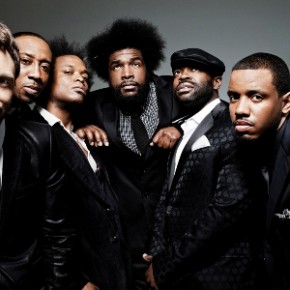 When The Roots made their debut in the early Nineties, they weren’t that much of an anomaly. Well, maybe they were in terms of size (how many hip-hop acts have more than three people?), but…jazz-rap was still a “thing”, so the Philly band’s sound wasn’t a total novelty. Groups ranging from A Tribe Called Quest to Digable Planets and Arrested Development used live instruments in their music. Black Thought was a dope MC from the jump, but he didn’t sound much different from any other twenty-something dope MC.
When The Roots made their debut in the early Nineties, they weren’t that much of an anomaly. Well, maybe they were in terms of size (how many hip-hop acts have more than three people?), but…jazz-rap was still a “thing”, so the Philly band’s sound wasn’t a total novelty. Groups ranging from A Tribe Called Quest to Digable Planets and Arrested Development used live instruments in their music. Black Thought was a dope MC from the jump, but he didn’t sound much different from any other twenty-something dope MC.
Nearly twenty years on, not only are The Roots almost the only hip-hop group standing, but their versatility and maturity has turned them into a solid contender for Greatest Hip-Hop Group of All Time. If you only know Thought, ?uesto, Hub and company as the house band for Late Night with Jimmy Fallon, you are doing yourself a major disservice. With all due respect to bands like Radiohead, The Roots might be the most consistently great recorded act in popular music over the last 10-15 years.
Their discography is certainly worth celebrating, so we decided to take a look at The Roots’ catalog, album by album, and break down the evolution of the band. Hope you enjoy reading this as much as we enjoyed putting it together.
Organix (1993)
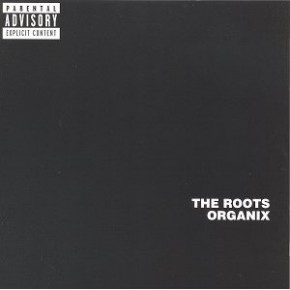 Drew: The self-professed peddlers of “organic hip-hop jazz” certainly deliver on Organix; it’s often regarded as a footnote in the Roots discography, if it’s regarded as a real album at all, but it’s fun to revisit the socially-conscious pioneers as hungry youths and see where they came from. Turns out, the Roots – or the Square Roots, as they were known in ’93 – were primarily concerned with rubbernecking nu-jazz and Black Thought discussing, at length, his oft-vaunted dopeness. Organix is more pared-down than latter-day Roots releases, this is true; the sound is essentially the kernel of the Roots formula through the next three records, but the grooves mostly hinge upon ?uestlove’s butter-smooth breaks, Hub’s thick fretless lines, and Scott Storch’s keyboard accents. What’s really interesting here is Thought – with more mic time than perhaps any Roots album since, he appears blissfully unaware of the social issues he’d attack in later verses, and sounds youthful and exuberant throughout. He trades vibrant verses with ?uestlove (yup, ?uesto logged some mic time on early Roots records) on the effortlessly catchy “Pass the Popcorn”, spits free-form beat poetry on “Writer’s Block”, and sounds positively spastic gasping for breath on a live take of early concert fave “Essaywhuman”. Tariq rarely has anything of note to say on Organix, but he always sounds great saying it; as for the album, well, it comes across as amateurish in the context of the Roots’ astonishing discography, but it’s a charming document of a young band figuring out what they do best. There’s something to be said for fun. Grade: B
Drew: The self-professed peddlers of “organic hip-hop jazz” certainly deliver on Organix; it’s often regarded as a footnote in the Roots discography, if it’s regarded as a real album at all, but it’s fun to revisit the socially-conscious pioneers as hungry youths and see where they came from. Turns out, the Roots – or the Square Roots, as they were known in ’93 – were primarily concerned with rubbernecking nu-jazz and Black Thought discussing, at length, his oft-vaunted dopeness. Organix is more pared-down than latter-day Roots releases, this is true; the sound is essentially the kernel of the Roots formula through the next three records, but the grooves mostly hinge upon ?uestlove’s butter-smooth breaks, Hub’s thick fretless lines, and Scott Storch’s keyboard accents. What’s really interesting here is Thought – with more mic time than perhaps any Roots album since, he appears blissfully unaware of the social issues he’d attack in later verses, and sounds youthful and exuberant throughout. He trades vibrant verses with ?uestlove (yup, ?uesto logged some mic time on early Roots records) on the effortlessly catchy “Pass the Popcorn”, spits free-form beat poetry on “Writer’s Block”, and sounds positively spastic gasping for breath on a live take of early concert fave “Essaywhuman”. Tariq rarely has anything of note to say on Organix, but he always sounds great saying it; as for the album, well, it comes across as amateurish in the context of the Roots’ astonishing discography, but it’s a charming document of a young band figuring out what they do best. There’s something to be said for fun. Grade: B
Big Money: The Roots are one of those bands whose evolution is pretty easy to chart. Perhaps Organix doesn’t sound as ground-breaking as their later triumphs, but it holds up well for what it is: an early ’90s hip-hop album. Sure, it’s no Midnight Marauders or Illmatic, but a solid “B” level release. It’s interesting now to hear Black Thought’s voice a few octaves higher than it is now, it’s interesting to hear ?uestlove sharing mic space, and (going back to Thought for a second), it’s good to hear him having fun. If there’s one word most Roots fans would shy away from after listening to their work of the past ten years, it would probably be “light”. Organix is certainly the most “light” The Roots have ever sounded. Grade: B
Do You Want More?!!!??! (1995)
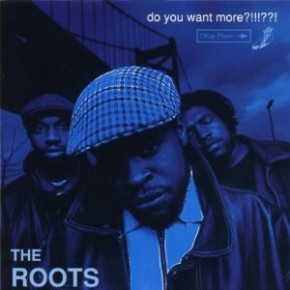 Drew: The Roots debuted on a major label with Do You Want More?!!!??! (hereafter referred to without superfluous punctuation), and to some degree, the change is easily identifiable. The loose, free-form grooves are still there, yeah, but the band appears to have tightened up, and focused the scattershot sometimes-brilliance of Organix. As a result, the Roots banged out a classic early on; Do You Want More maintains all the earmarks that made the band an early live sensation, with something new in the mix: memorable songs. The songs are given room to breathe, without being stretched past their obvious ending point, and the hooks and beats stick in the craw. “Proceed” finds Black Thought and partner-in-rhyme Malik B trading liquid rhymes over a stutter-step breakbeat; Thought croons Jodeci-style on jazzy slow jam “Silent Treatment”; “Datskat” and “Essaywhuman” (once again presented in an improvisational live take) examine the relationship between jazz and hip-hop in the Roots crew’s music, employing modal jazz flourishes and particularly astonishing verbal acrobatics from a scat-spitting Thought. One of hip-hop’s shining examples of an LP sustaining momentum and cohesion while paying attention to individual tracks, Do You Want More is essential Roots – less experimental than later records, but a boulder’s-through more accomplished than their first. Listeners who find themselves in a perpetual search for the perfect soundtrack to a mellow 2am can rejoice knowing that eight dollars is all that separates you from the album you desire. Grade: A
Drew: The Roots debuted on a major label with Do You Want More?!!!??! (hereafter referred to without superfluous punctuation), and to some degree, the change is easily identifiable. The loose, free-form grooves are still there, yeah, but the band appears to have tightened up, and focused the scattershot sometimes-brilliance of Organix. As a result, the Roots banged out a classic early on; Do You Want More maintains all the earmarks that made the band an early live sensation, with something new in the mix: memorable songs. The songs are given room to breathe, without being stretched past their obvious ending point, and the hooks and beats stick in the craw. “Proceed” finds Black Thought and partner-in-rhyme Malik B trading liquid rhymes over a stutter-step breakbeat; Thought croons Jodeci-style on jazzy slow jam “Silent Treatment”; “Datskat” and “Essaywhuman” (once again presented in an improvisational live take) examine the relationship between jazz and hip-hop in the Roots crew’s music, employing modal jazz flourishes and particularly astonishing verbal acrobatics from a scat-spitting Thought. One of hip-hop’s shining examples of an LP sustaining momentum and cohesion while paying attention to individual tracks, Do You Want More is essential Roots – less experimental than later records, but a boulder’s-through more accomplished than their first. Listeners who find themselves in a perpetual search for the perfect soundtrack to a mellow 2am can rejoice knowing that eight dollars is all that separates you from the album you desire. Grade: A
BM: My issue with the early Roots stuff is that in retrospect it sounds so common. In the early-mid Nineties, regardless of commercial success, there were quite a few groups that sounded like The Roots. These days, there’s NO one that sounds like The Roots. So my one problem with Do You Want More?!? is that it doesn’t seem as though The Roots have completely found their voice yet. That said, it’s a totally pleasant album. One thing that’s definitely different is that Black Thought was a more animated emcee than he is now (although not a better emcee-sit and think about that one for a minute.) You can lump this in pretty comfortably with Midnight Marauders, Digable Planets’ Blowout Comb, Souls of Mischief’s ’93 Till Infinity and Bizarre Ride II The Pharcyde and have a nice little mellow ‘90s hip-hop capsule. “Mellow My Man”, “Swept Away” and “Proceed” are solid songs that still probably sound great live but don’t have the thematic depth that later songs do-but I’m splitting hairs here. As far as brag-rap with musicality goes; you can’t do much better than Do You Want More. Also worth mentioning that this album presaged the neo-soul movement a year before D’Angelo, three years before Erykah Badu and five before Jill Scott. Although none of those folks had some dude screaming “break yo’ self!” in the middle of an on-stage skit. Grade: B
Illadelph Halflife (1996)
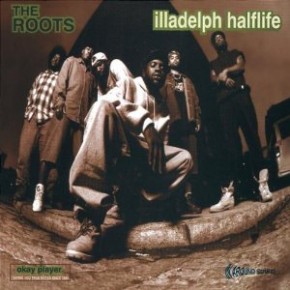 Drew: The Roots crew would take several sudden lefts in sound later in their career, but on an album-to-album basis, Illadelph Halflife marks the first significant diversion in the signature Roots sound. Here, the organic jazz is largely jettisoned in favor of something a little more hard-hitting and ominous; focal emcee Black Thought and his foil Malik B have graduated from a “hey, I’m nice on the mic and here’s why” mentality to social commentary and an occasionally bleak worldview. The push to be taken seriously is often successful, and you’ll find some of the Roots’ best early work here – the insidiously catchy “Section” and “Push Up Ya Lighter”, the demented opera/spaghetti western/hip-hop pastiche of “Concerto of the Desperado” (that’s a young Amiel Larrieux’s lovely voice wafting through the cracks of the beat), and the hall-of-fame head-nodder “What They Do” – but the album occasionally sags under its thematic weight, and tracks often start to bleed together. Coming off a major-label debut so crackerjack at maintaining a unified feel that never devolves into homogeneity, Illadelph comes across as accomplished and often brilliant, but the igniting spark that so often blasts the crew off into the qualitative stratosphere shows up only intermittently. Required listening, to be sure, and its virtuosity is not to be ignored, but in the grand pantheon of how exciting the Roots are able to be, Illadelph settles near the bottom. Grade: B
Drew: The Roots crew would take several sudden lefts in sound later in their career, but on an album-to-album basis, Illadelph Halflife marks the first significant diversion in the signature Roots sound. Here, the organic jazz is largely jettisoned in favor of something a little more hard-hitting and ominous; focal emcee Black Thought and his foil Malik B have graduated from a “hey, I’m nice on the mic and here’s why” mentality to social commentary and an occasionally bleak worldview. The push to be taken seriously is often successful, and you’ll find some of the Roots’ best early work here – the insidiously catchy “Section” and “Push Up Ya Lighter”, the demented opera/spaghetti western/hip-hop pastiche of “Concerto of the Desperado” (that’s a young Amiel Larrieux’s lovely voice wafting through the cracks of the beat), and the hall-of-fame head-nodder “What They Do” – but the album occasionally sags under its thematic weight, and tracks often start to bleed together. Coming off a major-label debut so crackerjack at maintaining a unified feel that never devolves into homogeneity, Illadelph comes across as accomplished and often brilliant, but the igniting spark that so often blasts the crew off into the qualitative stratosphere shows up only intermittently. Required listening, to be sure, and its virtuosity is not to be ignored, but in the grand pantheon of how exciting the Roots are able to be, Illadelph settles near the bottom. Grade: B
BM: Illadelph Halflife was definitely a big step forward for The Roots. They downplayed the overt jazz elements of Do You Want More?!? and Organix (although “One Shine” went full on jazz) for a sound that was clearly more boom-bap oriented. Black Thought made definitive strides as an emcee, but still hadn’t found his own voice yet. Actually, there are parts of this album that make me rub my eyes and wonder if someone threw on my copy of Illmatic by mistake. The album takes some time to truly get cooking, but tracks like “Push Up Ya Lighter” (featuring the ever-cool Bahamadia) and the intense “Concerto of the Desperado” belong on any Roots mixtape. Common delivers a tight-as-hell verse on “Universe At War,” and of course Raphael Saadiq’s smooth guitar, vocals and production enlightens “What They Do,” which was the first Roots song that could even remotely be considered a hit. Of course, the hilarious video for that song got them on MTV and also reportedly got them into a gang of trouble with Sean Combs and his minions.The album’s standout track, to my ears, is “The Hypnotic,” a song that pointed the direction to future Roots albums (and started a fruitful partnership with D’Angelo.) Grade: B+
Things Fall Apart (1999)
 Drew: Importance is asserted from the jump in Things Fall Apart – the Chinua Achebe-cribbing title, the arresting and devastating cover photo, the insistence that hip-hop is slowly eating itself alive. As an album, its aspirations are lofty, and the record itself sags a bit under the weight of considerable bloat; fortunately, the Roots are in control, and even when the record nears its samey middle section, it still manages to crisply emanate that crisp, insidious knock that the in-the-pocket Roots handle so well. And Things‘ classics are often incredibly exciting: “The Next Movement” still bumps, 12 years on, with a restless, freewheeling energy that The Roots would eventually trade in for artistic merit, Black Thought’s nimble rhyme-off with Mos Def on “Double Trouble” is the stuff mixtapes are made for, and the slinky “You Got Me” boasts a thoughtful premise and perhaps the most irresistible, sultry chorus of The Roots’ career. It’s big, it’s imperfect, and it’s pretty highbrow, all told, but it’s also proof that The Roots are never really off. Grade: B+
Drew: Importance is asserted from the jump in Things Fall Apart – the Chinua Achebe-cribbing title, the arresting and devastating cover photo, the insistence that hip-hop is slowly eating itself alive. As an album, its aspirations are lofty, and the record itself sags a bit under the weight of considerable bloat; fortunately, the Roots are in control, and even when the record nears its samey middle section, it still manages to crisply emanate that crisp, insidious knock that the in-the-pocket Roots handle so well. And Things‘ classics are often incredibly exciting: “The Next Movement” still bumps, 12 years on, with a restless, freewheeling energy that The Roots would eventually trade in for artistic merit, Black Thought’s nimble rhyme-off with Mos Def on “Double Trouble” is the stuff mixtapes are made for, and the slinky “You Got Me” boasts a thoughtful premise and perhaps the most irresistible, sultry chorus of The Roots’ career. It’s big, it’s imperfect, and it’s pretty highbrow, all told, but it’s also proof that The Roots are never really off. Grade: B+
BM: Normally when we’re talking about an emcee taking a big leap forward lyrically, we’re talking about someone who was wack to start (and probably has a ghostwriter—thoughts of Fat Joe and Bow Wow come to mind.) Things Fall Apart may have been The Roots’ commercial breakthrough (getting them on urban radio, winning a Grammy and going Platinum,) but it’s more notable for being Black Thought’s coming out party. The Roots’ sound went to the next level, becoming more soulful and grandiose, and Tariq went from a good emcee to a great emcee. Interestingly, this is also the album where The Roots’ supporting cast comes into their own; as Dice Raw and Malik B. both deliver their most memorable verses on songs like “Adrenaline” and the skit “Diedre Vs. Dice.” Things Fall Apart would be a high-water mark for just about any artist. The fact that it actually sits somewhere in the middle of the Roots’ catalog-qualitatively speaking-speaks volumes about how good this band is.-Grade: B+
Phrenology (2002)
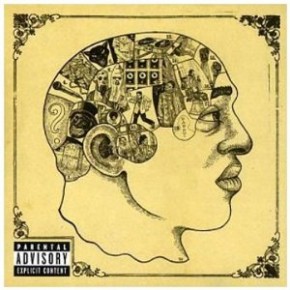 Drew: Perhaps the Legendary Roots Crew’s most exciting, vital recording to date, Phrenology is a bit of a tall order at times. Emerging as something of a spiritual successor to Pearl Jam’s dark, grimy 1995 record Vitalogy, Phrenology scatters The Roots’ ever-expanding bag of tricks all over the studio floor. Neo-soul beauty collides with pitch-black social commentary; traditional boom-bap stands shoulder-to-shoulder with straightforward punk-rock; ?uestlove’s unerring ear for rhythmically intriguing compositions reaches its apex here, each drum hit as crisp and propulsive as the last. The album’s as mad as a hatter, really, but who cares when the results are this euphoric? “Water”‘s insistent, minimalist funk gives way to a harrowing sound collage; forbidden-love slow-jam “Break You Off” is glorious, sexy even, until it gives way into an unnerving coda; Black Thought, your favorite emcee’s favorite emcee, forcefully commands respect and attention with the crackerjack “Thought@Work”, an aggressively funky workout that finds Thought dutifully, resiliently ripping microphones in half like phone books. The long runtime and genre ping-ponging can be exhaustive, but ultimately rewarding: if The Roots are hip-hop’s Beatles, and the forward-thinking but genre-bound Things Fall Apart their Rubber Soul, then Phrenology, a probing, sprawling masterwork, is their very own White Album. Grade: A
Drew: Perhaps the Legendary Roots Crew’s most exciting, vital recording to date, Phrenology is a bit of a tall order at times. Emerging as something of a spiritual successor to Pearl Jam’s dark, grimy 1995 record Vitalogy, Phrenology scatters The Roots’ ever-expanding bag of tricks all over the studio floor. Neo-soul beauty collides with pitch-black social commentary; traditional boom-bap stands shoulder-to-shoulder with straightforward punk-rock; ?uestlove’s unerring ear for rhythmically intriguing compositions reaches its apex here, each drum hit as crisp and propulsive as the last. The album’s as mad as a hatter, really, but who cares when the results are this euphoric? “Water”‘s insistent, minimalist funk gives way to a harrowing sound collage; forbidden-love slow-jam “Break You Off” is glorious, sexy even, until it gives way into an unnerving coda; Black Thought, your favorite emcee’s favorite emcee, forcefully commands respect and attention with the crackerjack “Thought@Work”, an aggressively funky workout that finds Thought dutifully, resiliently ripping microphones in half like phone books. The long runtime and genre ping-ponging can be exhaustive, but ultimately rewarding: if The Roots are hip-hop’s Beatles, and the forward-thinking but genre-bound Things Fall Apart their Rubber Soul, then Phrenology, a probing, sprawling masterwork, is their very own White Album. Grade: A
BM: You’ve heard the phrase “everything but the kitchen sink”, I’m sure. Well with Phrenology, The Roots threw everything including the kitchen sink in that motherfucker and wound up with not only the album of their careers, but arguably the best hip-hop album of the 21st century so far. I’m of the mind that artists can go one of two ways when they record their commercial breakthroughs. They can either sell out, or take the confidence built by selling records and attracting a large audience and build it into something more daring. The Roots obviously took the latter route, and the results were glorious. The band eases stealthily through slow jams (“Break You Off” and “Sacrifice”), blues-rock (“The Seed 2.0”), and space-jazz-what the fuck is this?!? (“Water”), while Black Thought waxes poetic on ills political (“Pussy Galore”) and self-referential (the breathless “Thought @ Work.” Near-perfection from beginning to end. Grade: A
